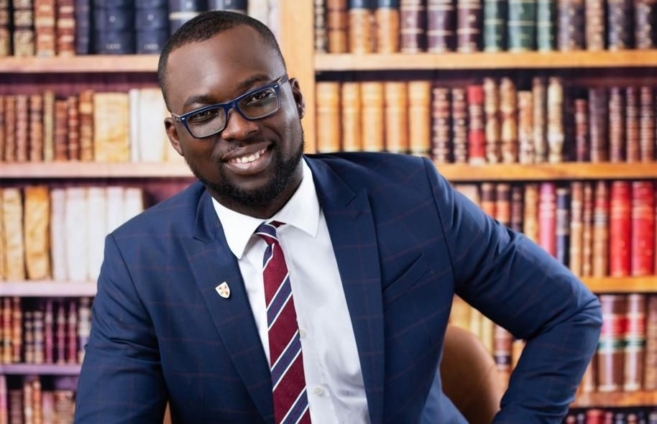
Lead consultant for the Robert Smith Law Group, Bobby Banson, has advised Ghana’s Attorney General and Minister for Justice, Godfred Dame, to step down from his role in response to the raging controversy over his alleged involvement in witness tampering.
Banson asserted that if he were in the Attorney General’s position, he would resign as a means of preserving the credibility of the office.
The allegation stems from Richard Jakpa, an accused person standing trial alongside Dr. Cassiel Ato Forson, for allegedly causing a financial loss of €2.37 million to the state in a deal to procure ambulances for the country.
Jakpa claimed in court that Dame had repeatedly sought his assistance to implicate Dr. Forson in the ongoing trial.
At a press conference on Tuesday, NDC National Chairman Johnson Asiedu Nketia played a secret recording of the AG and Jakpa, warning that if the president does not heed their demands to sack Mr. Dame, a future NDC government will take action.
“If I were him, I would step aside. You know you are dealing with a situation where somebody you are cross-examining in a very highly sensitive case involving a politically exposed person says that you have attempted to influence the nature of my evidence. That is some wild allegation, and so if it is made, and it is prima facie evidence of a recording, you would clear yourself,” said Banson.
According to Banson, stepping aside from the role would allow independent bodies such as the General Legal Council or a commission of Inquiry to conduct thorough investigations into the allegations without interference.
“Because the Attorney-General remains the adviser to the government in all legal matters. If you are setting up a commission of inquiry, will the president require an opinion from the Attorney General’s Office? What would I do in that capacity? If it is the General Legal Council, is the Attorney General represented in the General Legal Council? Would there be conflict? So, I would step aside and allow this investigation mechanism to go through. At the end of the day, his career was there before this office. So, if there is anything that would threaten his career, which the NDC and other members are making calls for, I think it is a very serious allegation, that he would need his name cleared,” he noted.
If there is ‘reasonable doubt’, an accused person must be given the benefit of the doubt and found not guilty of the charge. Justice is best served if trials take place without undue delay. This helps protect the reliability of evidence and minimize the human impact of criminal proceedings on everyone involved. If you are accused of a crime, you have the right to a fair trial to determine whether you are innocent or guilty. This is an internationally recognized human right. Fair trials help establish the truth and are vital for everyone involved in a case. They are a cornerstone of democracy, helping to ensure fair and just societies and limiting abuse by governments and state authorities.
The power of the state to arrest, prosecute, and punish an individual is the most coercive use of state authority short of warfare. This power must be exercised with restraint, and there must be safeguards in place to protect the rights of accused people throughout the criminal process. People who have been suspected of a crime should be treated with dignity and compassion, and if convicted, should not be defined by this act.
Protecting the right to a fair trial is not just about ensuring that the processes leading up to and following a trial protect an individual’s fundamental rights. It’s also about ensuring that our criminal legal systems and the societies we live in are fair, equal, and just.
To achieve this vision, Fair Trials opposes overcriminalization; the misuse of state power, and recourse to incarceration. We also work to eliminate the discrimination and bias that is embedded in criminal legal systems around the world.
Presumption of innocence A fundamental principle behind the right to a fair trial is that every person should be presumed innocent until proven guilty. But in practice, there are many ways that this right is undermined. Accused people are often treated as criminals before they have had their day in court, for example when law enforcement parade arrested people through public places so they can be photographed by the media – also known as perp walks or by requiring accused persons to wear measures of restraint that make someone appear dangerous. The presumption of innocence is also undermined by mass surveillance, the use of artificial intelligence to profile people, coercive policing practices, and pre-trial detention.
It is the responsibility of the state to prove that someone is guilty, not for someone who is accused of a crime to prove their innocence. Equally, it is the responsibility of the state to prove that someone should be detained. People should not be coerced into confessing to a crime or to incriminate themselves through abusive interrogation tactics or by the threat of enhanced punishment for the assertion of fundamental rights. In general, if someone exercises their right to silence, it should not be used as evidence of guilt or as a reason to place them in pre-trial detention, and nor should they be penalized for it.
Being convicted of a crime can have serious, sometimes devastating, consequences for the convicted person, their family, and the wider community. Therefore, states should prove that it is necessary to bring a prosecution and then must prove guilt to a high standard. If there is ‘reasonable doubt’, an accused person must be given the benefit of the doubt and found not guilty of the charge.
Justice is best served if trials take place without undue delay. This helps protect the reliability of evidence and minimize the human impact of criminal proceedings on everyone involved.
The rule of law requires state authorities to operate within the law and to be held to account. It also means that everyone within a state is subject to the same laws. Nobody, however rich or powerful, is above the law.
The rule of law means that something should only be a crime if it is prohibited by a law that has been created publicly and following a proper process that clearly establishes both the prohibited act and the requisite mental state to establish criminality. This is critical so that people can understand what is and is not allowed.
New criminal laws can only apply to future actions and not retrospectively. If something was not considered a crime when it was carried out, then it is not unlawful. If a law is repealed or overturned, people who were previously convicted are entitled to redress.
The rule of law requires criminal laws to be enforced in a uniform way. This can mean that special measures are needed to give some people a fair chance to present their defense. For example, some people may need an interpreter to make sure that they understand their rights. Children and vulnerable adults may need additional support so that they can take part effectively in criminal proceedings.
Courts must be impartial and independent, and created by and subject to the law. Those who are empowered to determine whether an accused person is subjected to pretrial detention, the manner and extent of the investigation, or ultimately to decide whether the accused is guilty and impose a sentence must be neutral and make a fair assessment of the facts.
Right to an effective remedy: Everyone has the right to an effective remedy by competent national courts for acts violating the rights granted by the constitution, by law, or by the deed, notwithstanding that the acts were committed by persons in an official capacity. (a) The right to an effective remedy includes: 1. access to justice; 2. reparation for the harm suffered; 3. access to the factual.
The writer: AYM Kukah. E-mail:kukahalexander7@gmail.com



